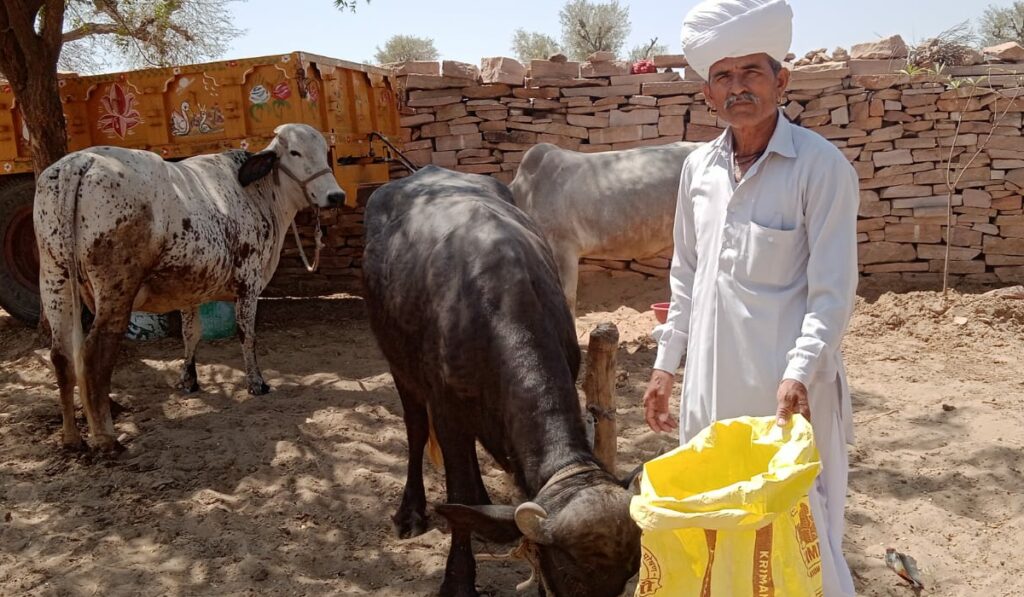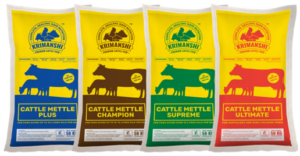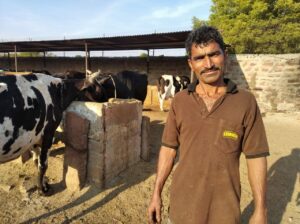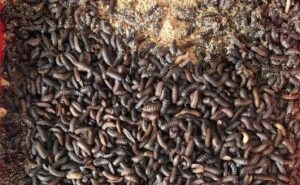Krimanshi Technologies
Krimanshi is an award-winning social enterprise working in dairy input innovations to manufacture high-quality animal feeds from surplus agriculture and food residues. Krimanshi is based in Jodhpur, Rajasthan. Nikhil Bohra, the founder and CEO has researched cultivating and harvesting micro-algae as an alternative food and has developed a unique formulation for animal feeds which increases milk production.
The Problem
Only 11% of the farmers’ animal feed requirements are met by the feed industry. One of two farmers encounters adulterated feeds/ toxins without quality assurance on local ingredients and feeds. Conventional practices are still followed at large, leading to protein/ mineral imbalance, underfeeding/ overfeeding and ultimately low productivity and health. Currently, there are over 100 million livestock farmers in India who are in need of feed and fodders as basic nutrition for their animals daily. Yet, micro-scale manufacturers/ suppliers are seasonal, lack credit to stock feed commodities and have meagre knowledge of ingredients and feed formulation. Fortunately, with elaborate governmental initiatives to drive digitisation in Indian agriculture, farmers are increasingly exposed to the potential benefits of adopting innovations. This has thus made them more open to advisory services and adopting better quality products offered by Krimanshi.
Adopting a Climate Lens – Upcycling Agri Waste and Creating Livelihoods
Krimanshi provides affordable nutritive feed solutions for cattle to small dairy farmers all year round without compromising the quality. They do it by upcycling food waste into low-cost nutritious cattle feed and fodder. They collect food waste from Agri-hubs in the form of fruit leaves, crushed fruits, vegetable waste etc. and process them into different types of feeds. By upcycling waste into animal feed, Krimanshi adopts a climate lens by reducing emissions and generating livelihoods for low-income dairy farmers who cannot afford high-protein dairy feed and are looking for cheaper animal feed alternatives. The cattle feed helps the farmers increase the milk productivity of the cattle and also improves gut health, thereby reducing farmers’ veterinary spendings and increasing milk production.
Through a circular economy model, Krimanshi reduces GHG emissions while providing a 365-day feed supply (prepared from upcycling the decomposing agro-wastes) to farmers. Every ton of food waste recycled prevents 1.9 tons of CO2 equivalent from entering the atmosphere. They have upcycled 1000+ tons of food residues/waste up to now.
The different products by Krimanshi.
Success Stories
Krimanshi prevented over 900 tonnes of CO2 emissions in the past year. The recirculation of productive resources for food production thus contributes to a circular economy, where pollution and waste are reduced while economic benefits are reaped. For instance, Krimanshi farmers have witnessed up to a 20% increase in milk production, saving 10% on feed costs with a 60% reduction in veterinary spendings. Overall, a farmer would make or save around Rs.25-30k per cow annually. This data is collected from over 200 farmers and 10 villages, including Rajasthan and Uttar Pradesh.
Scalability of Services
Krimanshi currently manufactures four products: Concentrate Feeds & Mineral Mixes and other allied products like Silage and Fodder. In terms of scalability, Krimanshi has applied the same concept to other types of feed and observed further success.
Krimanshi has been conducting aqua and poultry feed trials with fish and poultry farmers in Vijayawada and Vellore who have been giving insect meals. They have recently launched their product line of insect protein meal called Kri-Meal for poultry and aqua feed by rearing and processing waste through Black Soldier Fly larvae. Insect farming is seen as an efficient source of protein for animal feed and requires fewer resources, including land and water. Commercial fish feeds consist of fishmeal (groundfish), fish oil and Soy meal. Producing these feeds is resource intensive and unsustainable in the longer run. Instead, the insects feed on segregated municipal solid waste, thus diverting waste from landfills and averting methane emissions in the environment. Furthermore, during trials, they have witnessed a 10% increase in egg weight in 50+ birds and a reduction in maturity time among fishes. This demonstrates the scalability of Krimanshi’s innovations.
Villgro Innovations Foundation believes in the change Krimanshi aims to bring and supports them financially and non-financially to scale. Krimanshi has been supported with access to credit through a partnership between Villgro and Caspian that enabled them to commercialise the insect protein business.




















